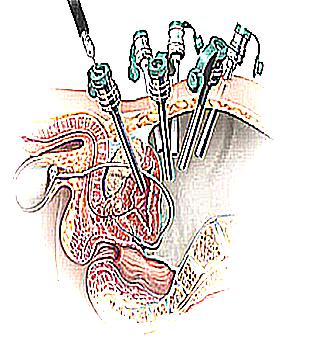Home >
Erectile Dysfunction >
Restoration of potency after removal of the prostate
Restoration of potency after removal of the prostate

Radical prostatectomy is a common treatment that involves removing the prostate gland and surrounding tissue. The manipulation is carried out with the aim of eliminating malignant (cancer) and benign (adenoma) neoplasms of the prostate gland.
When an operation is necessary
Removal of the prostate gland is performed to help patients suffering from prostate cancer. Surgical treatment is most effective at stages 1 and 2 of cancer, until the tumor begins to spread metastases. Prostate carcinoma detected at an early stage of the course requires complex care with the use of radio and chemotherapy. Radical prostatectomy is performed if the patient is under the age of 70. An unconditional indication for the removal of the prostate is a biopsy report confirming active tumor processes and the development of malignant changes in the tissues of the prostate gland. Surgery to remove the prostate gland is not a guarantee of complete recovery from cancer. As you know, malignant tumors are prone to recurrent development 2-4 years after radical treatment. Removal of the prostate gland is also performed with benign hyperplasia. A patient suffering from adenoma is advised to perform a prostatectomy at:
- increased residual urine
- acute urinary retention
- urinary tract infections
- acute renal failure
- stones in bladder
- blood in urine
Complications after surgery
Carrying out an operation to remove the prostate gland can cause a deterioration in the patient's well-being due to:
- infectious lesions of the perineal area
- urinary incontinence
- local bleeding
- the appearance of strictures (pathological narrowing) and fistulas
Contraindications
Patients cannot undergo radical prostatectomy if they have the following disorders:
- acute cardiac pathologies
- inflammatory processes
- fever
- malignant tumor of the prostate gland with metastases
Impact of surgery on sexual health
Among the consequences of radical prostatectomy, a decrease in sexual desire and erectile dysfunction are often called. Damage to the network of nerve cells located near the prostate gland poses a particular danger to male sexual health. These nerve fibers serve as the main means of controlling the erection process. Damage or removal of nerve endings that were not isolated during surgery can seriously harm the reproductive organs. About half of men who have undergone prostate removal can fully restore erectile function and normal libido. The rehabilitation period usually lasts from 6 to 12 months. The rate of regeneration of genital tissues depends on the following significant factors:
- the age and state of health of the man
- the correctness of the surgery
- the level of erectile ability before surgical treatment
Ways to restore potency after radical prostatectomy
The most effective way to treat impotence after removal of the prostate gland is physiotherapy and taking tonic drugs based on sildenafil, tadalafil or vardenafil. Men who have undergone major surgery need to overcome a psychological barrier. To establish a sexual life, the patient must feel confident in his abilities. Support from a sexual partner and regular sexual activity can help get rid of the fear of failure and compulsive waiting syndrome. A set of physical exercises designed to strengthen the muscles of the perineum and restore control over urination will help improve the strength of sexual potency during the first year after surgery. Vacuum treatment has a positive effect on the patient's sexual health. For additional muscle relaxation and optimal blood circulation in the genitals, doctors recommend injecting special suppositories into the urethra. The action of the plastic applicator with a penile suppository helps to reduce the tone of the arterial vessels of the groin and to actively stimulate blood flow in the intimate area. In some cases, men are advised to undergo surgical treatment for impotence after prostatectomy.



























